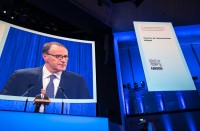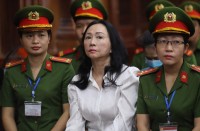
BELGIUM, Brussels (AFP) — The participation of the International Monetary Fund in the Greek bailout programme is “non-negotiable”, the head of eurozone finance ministers said on Thursday (January 26).
Speaking at the end of a monthly meeting of eurozone finance ministers in Brussels, Jeroen Dijsselbloem said future bailout programmes for Greece may be carried out without the IMF, but for the current one, the participation of the IMF was “non-negotiable” because of the expertise of the fund and its financial contribution.
“There are also a number of member states that have been adamant about the IMF’s involvement regarding this programme so that is not negotiable at this point. For the future, I can very well envisage, with the expertise of the ESM already very much involved, that future programmes, which I don’t hope to see, but you never know, would be done by European institutions only,” he told a news conference held after the meeting.
The IMF has not yet decided whether it would participate in the current 86-billion-euro financial aid programme for Greece, the third one since 2010.
Dijsselbloem also said that ministers discussed international risks and that led to an agreement over continued support for free trade deals.
“Look we are not protectionists. We, from Europe, should continue to work on free trade, of course upholding European standards that we have, labour protection, environmental protection, etc. But yes, free trade, and there are lots of opportunities still out there. The Commission is working on a number of free trade deals around the world, in Asia, possibilities for Latin America, as the relation, the trade relations with Latin America and the U.S. seem to be stressed already. There are opportunities out there, and I think we should reach out to all those regions from Europe, and say look, we still want to work together, we still believe in good and fair trade deals, and let’s do it. That’s the atmosphere and that’s the way we spoke about it today. And that’s the signal also to the new government in the U.S.”, Dijsselbloem said.







